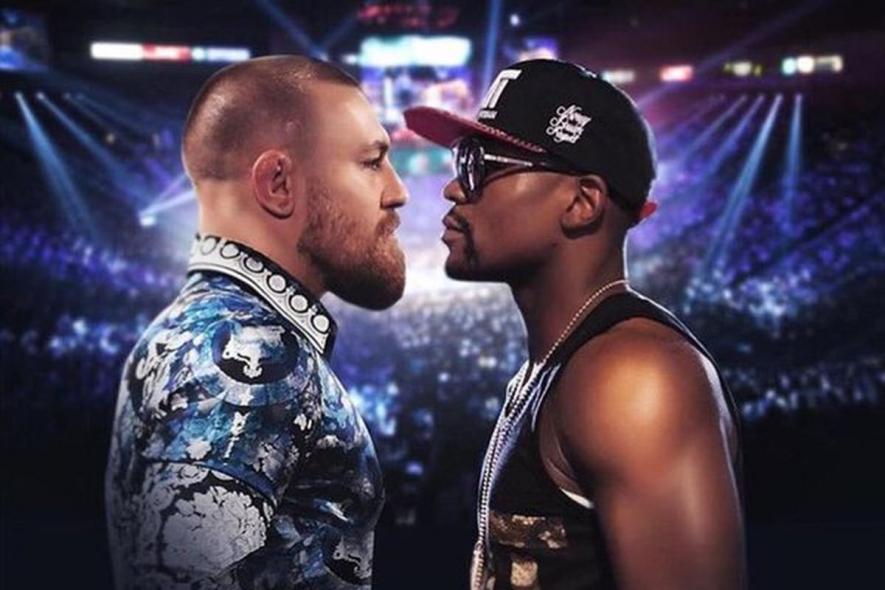The Biggest Con In Sports: Mayweather Versus Mcgregor

The so-called fight of the century was, in fact, an event organised by two morally-questionable “competitors” – actually business partners – in a blatant effort to get rich(er) without trying too hard.
Two days ago sport’s third athlete-billionaire was minted in, not oddly at all, at an arena on the LAs Vegas strip. Floyd Mayweather (aforementioned billionaire) fought Conor McGregor on August 27 (India time) in a so-called boxing match that was, in fact, one of sports greats cons ever. Watching the bout, and therefore buying in to the con, has made me question the very fundamentals of what I consume.
First let’s consider the two principal characters in this grand illusion. 40-year-old Mayweather, an undefeated welterweight with a 49-0 record was, ostensibly, putting on the line his entire legacy in the sport by taking on McGregor, a Mixed Martial Arts (MMA) champion with numerous titles and controversies under his belt. Neither of the two fighters has proved a worthy role model to their legions of fans. Mayweather—even if you ignore the “Money” epithet he goes by—has a deplorable record of domestic abuse that would probably have led to serious repercussions in any professional sport that has a controlling authority and specified rules. Though he denies most of the allegations—and defends himself on the basis of the lack of photographic evidence of his crimes—the fact is that he has been convicted on battery charges multiple times. The first goes all the way back to 2002 when he pled guilty to two counts of battery against Melissa Brim, the mother of his daughter Iyanna, and received a suspended sentence. In 2003 he was again convicted of two counts of battery and received a suspended sentence along with instructions to undergo “impulse control counselling” or anger management. This verdict was later vacated, apparently because a deal was struct between Mayweather and the victims—two friends of Josie Harris (with whom Mayweather has three children) who he had punched and chased out of a Las Vegas nightclub. In 2005 he stood trial for battery again, but Harris changed her testimony on the witness stand and claimed she had lied in her allegations. Mayweather was acquitted. Then, in 2010, after another episode with Harris in which their children were also reportedly present, Mayweather plead guilty to “misdemeanour domestic assault and harassment” and was sentenced to 90 days in jail. He served a month before being let off for good behaviour. Domestic violence and abuse is a complicated subject with no easy answers.
Boxing has a long history of incidents involving high profile athletes and the women in their lives. But, because of the nature of the sport’s organisation (or lack of it) there will always be a fight for a character such as Mayweather. Particularly when there is big money to be made. With its four sanctioning bodies—independent but competing for their piece of the pie—someone will always be eager to sanction a big-ticket event. This is not to suggest that Mayweather if beyond reform, or that anyway with a history of domestic abuse should be locked away forever. Those kinds of absolutist solutions do nothing to address the wider, societal problem. However to come out in support of this event, even as a dispassionate consumer, amounts to wilfully ignoring (perhaps even condoning) the more vile facets of the personas of those getting in the ring. “Why does Mayweather remain such a compelling figure despite his repeated and documented instances of domestic abuse,” writes Soraya Nadia Macdonald on theundefeated.com in a detailed piece exploring the nuances of domestic violence, particularly against black women and in the context of Mayweather. “Let us count the ways: There are no publicly available photos showing the evidence of his crimes; there’s no central organization to hold Mayweather and other abusive boxers to account; and there’s an understanding, however contentious, that some boxers are inherently violent, their rage uncontrollable. Furthermore, there’s a long-standing pattern of victims, especially black women, holding their tongues to protect the black men who hit them. All of those factors leave some fans torn, some indifferent and some completely disgusted. Despite the moral split decision, many boxing fans remain reliable spectators who continue to reward Mayweather with cultural cachet, fame and money, money, money.”
McGregor, 29, on the other side of the ring, is not a convicted criminal. He is regarded by some in Ireland as a working-class hero. His rise from living on the dole, working as a plumber’s apprentice, to the most celebrated fighter in mixed martial arts was impossible to ignore. Irish sports writer Ewan MacKenna interviewed McGregor four years ago, before all the fame and money. “…it was fascinating and fresh,” he recalls in Ireland’s Independent. “Freestyle wrestling. Thai boxing. Even his first flirtation with capoeira—the Brazilian fight dance, he explained, that originated with African slaves who didn't want their masters to know they were training so they disguised it as rhythmic movement. It was hard not to be drawn into how he broke down a game that many see as barbaric, making it sound like chess as he studied anything and everything to improve himself and his chances. Ultimately, that day he promised himself that no matter what came bolting around the corner, it would never change him and, not fancying the walk back up the Long Mile Road, he grabbed his beat-up phone and asked his girlfriend for a lift home in her banged-up Peugeot and all you wanted to do was root for him as this was what sport was supposed to be about.”
Change, though, is inevitable. And with every successive paycheck McGregor’s public persona has become a parody of his former self. His posts, interviews and appearances all have a common theme—money. He is quick witted, funny even, but the decision to always sound outrageous has led to a distinct shallowness with overtones of racism, parochial psuedo-nationalism and even misogyny. He has referred to an opponent of German origin as a nazi and, more recently, told Mayweather (a black athlete) to “dance for me, boy”. In a 2015 interview with ESPN’s Highly Questionable he was asked about his romantic side. This is what he said, “I don’t know about romance but I like to get down occasionally. I don’t really have a romantic side is what I am saying. If I go for it, I’m going in for the kill, you best believe that. You will not catch me walking down the beach holding hands. You will catch me going deep.” No longer requiring a lift home in a girlfriend’s old car, McGregor instead posts pictures of flashy cars and tweets about how “fucking great his life is”.
Taking a leaf out of the book written by the man who calls himself “Money”, McGregor maintains that, “It’s about the money, really. What else is it about,” he asks.
Definitely not sport, is the short answer to McGregors question. Some fans might make the argument that watching the fight had little to do with the men in the ring. It was about their love for the sport. These consumers of Sunday’s fight, in my opinion, have been cheated more than most. Boxing in a ring, against a highly experienced opponent, is a whole different scenario from working out in the gym. McGregor came out punching. His range—the longest of any fighter Mayweather has faced—caused some problems. But McGregor is a poor boxer, if he is one at all. His punches lacked any sort of leverage or weight, which is why the ones he landed in the opening rounds of the fight did more damage to him—in terms of energy expended by throwing them—than to his opponent. Even on his ageing legs Mayweather progressively dominated the fight as the rounds wore on. An amateur took on a retired champion and together they decided to bill it as the fight of the century. Nothing was at stake. The business partners hugged it out after the fight, lied about how close it was and laughed all the way to the bank. We are the suckers who paid for it all.
Here in India very few of us follow professional boxing. Of the friends with whom I was planning to watch the fight, some might have trouble identifying Anthony Joshua (for example) in a room full of white people. Yet, all of us knew what the result was going to be. I had predicted a decision win for Mayweather. Fortunately, for the future of McGregor’s cognitive abilities, referee Robert Byrd stopped the fight in Round 10. By then the MMA fighter was barely able to throw and punch and quite clearly out on his feet. Despite the farce of a “contest”, we watched.
And, even after the fight, the deceit continued with McGregor saying he could have continued. It is clear to anyone from the video that not only was he in no shape to go on but also that he was making no attempt to remain in the fight. By not throwing any punches and constantly clinching McGregor was, in fact, begging the ref to end his night of pain. Had the situation been reversed—not that Mayweather would have ever agreed to an MMA fight—McGregor would have ended it in the first round. So where was the contest? What exactly did we buy into?
The only answer that seems clear to me is that there is an attempt to change sport into the world’s most efficient pyramid scheme. What makes it great is that most of those buying in don’t even expect anything in return—save a good contest. The imagery of champions coming from poor communities and ending up flying private jets and partying with A-listers leads to a never-ending stream of young athletes from those very same communities willing to put everything on the line to achieve what is no longer a means but the end in itself—making money. These young men and women provide an endless supply of talent, raw material, bodies, personality, with whom the men in suits can tinker and toy until they become the “next big thing”. Every now and then a Floyd Mayweather will be heralded as an example of what athletes can achieve if they are willing to shed some blood and take a few knocks.
As someone who spends a great deal of life engaged with sport—consuming, playing, writing about, promoting—the events of August 27 have shattered another layer of illusion. From the man-made oasis of excess that is Las Vegas I was told, by none other than the fighters themselves, that sport is not about competition. It is not about fair-play. It is not a tool for education and social change. Its not even about fun. I was told that poor and middle class people all over the world need to aspire to one goal and one goal alone. And I was told that if you sell it right, there will always be enough chumps to buy into your idea, irrespective of its substance.
Well, its time we stopped being those chumps. The Mayweather-McGregor event was only the latest in a series of events in world sport that should have toppled the existing order. There is rampant doping in cycling and athletics, fixing in cricket, absurd transfer markets and astronomical TV rights in football and in India the mushrooming of all sorts of leagues and tournaments of which barely any create real value. In a time defined by consumption we have the power because we are the consumers. It is imperative that we are discerning in discharging that power. It is up to us to decide who and what is idolised and aspired to and what and who will come to define our generation. And I, for one, don't think it should be Messrs. Mayweather and McGregor.
Disclaimer: The views expressed here are the author's personal views, and do not necessarily represent the views of Newsclick.
Get the latest reports & analysis with people's perspective on Protests, movements & deep analytical videos, discussions of the current affairs in your Telegram app. Subscribe to NewsClick's Telegram channel & get Real-Time updates on stories, as they get published on our website.
























